International Economics: Impact of US Steel and Aluminum Tariffs
VerifiedAdded on 2021/04/17
|6
|1112
|28
Essay
AI Summary
This essay delves into the economic consequences of the US government's decision to impose import tariffs on steel and aluminum in 2018. It examines the potential impacts on the US economy, referencing an article from Forbes. The essay explores how these tariffs, aimed at protecting domestic producers, could negatively affect the overall economic landscape. It utilizes economic concepts such as price elasticity of demand and the cost of production to illustrate how increased import tariffs might lead to higher production costs, decreased supply, and shifts in consumer preferences. The analysis suggests that, despite the initial intent, such trade restrictions could ultimately harm the economy by affecting productivity, employment, and potentially leading to outsourcing of manufacturing activities. The essay concludes that while the policy aims to boost domestic industries, it may create a broader economic crunch with adverse long-term effects.
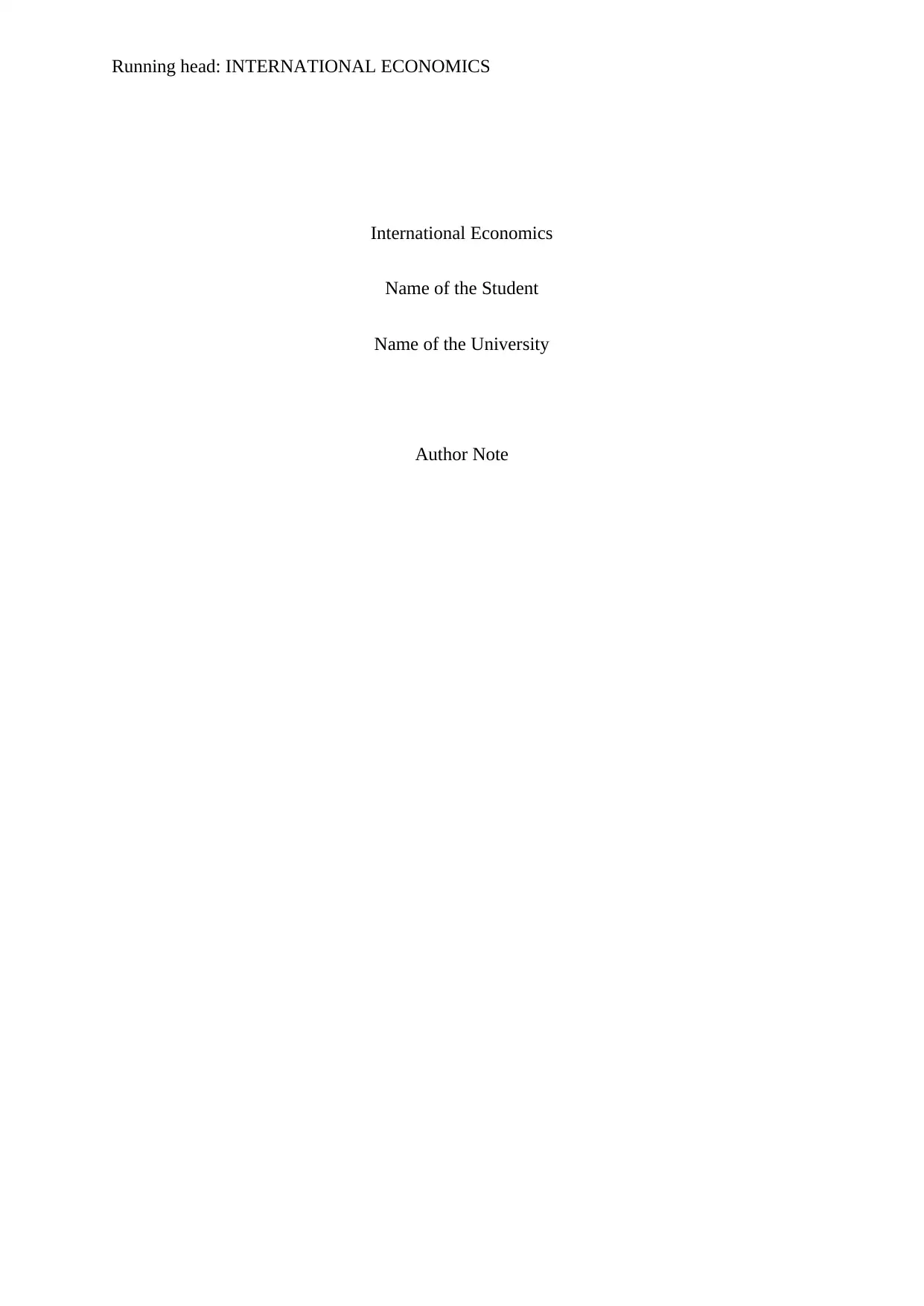
Running head: INTERNATIONAL ECONOMICS
International Economics
Name of the Student
Name of the University
Author Note
International Economics
Name of the Student
Name of the University
Author Note
Paraphrase This Document
Need a fresh take? Get an instant paraphrase of this document with our AI Paraphraser
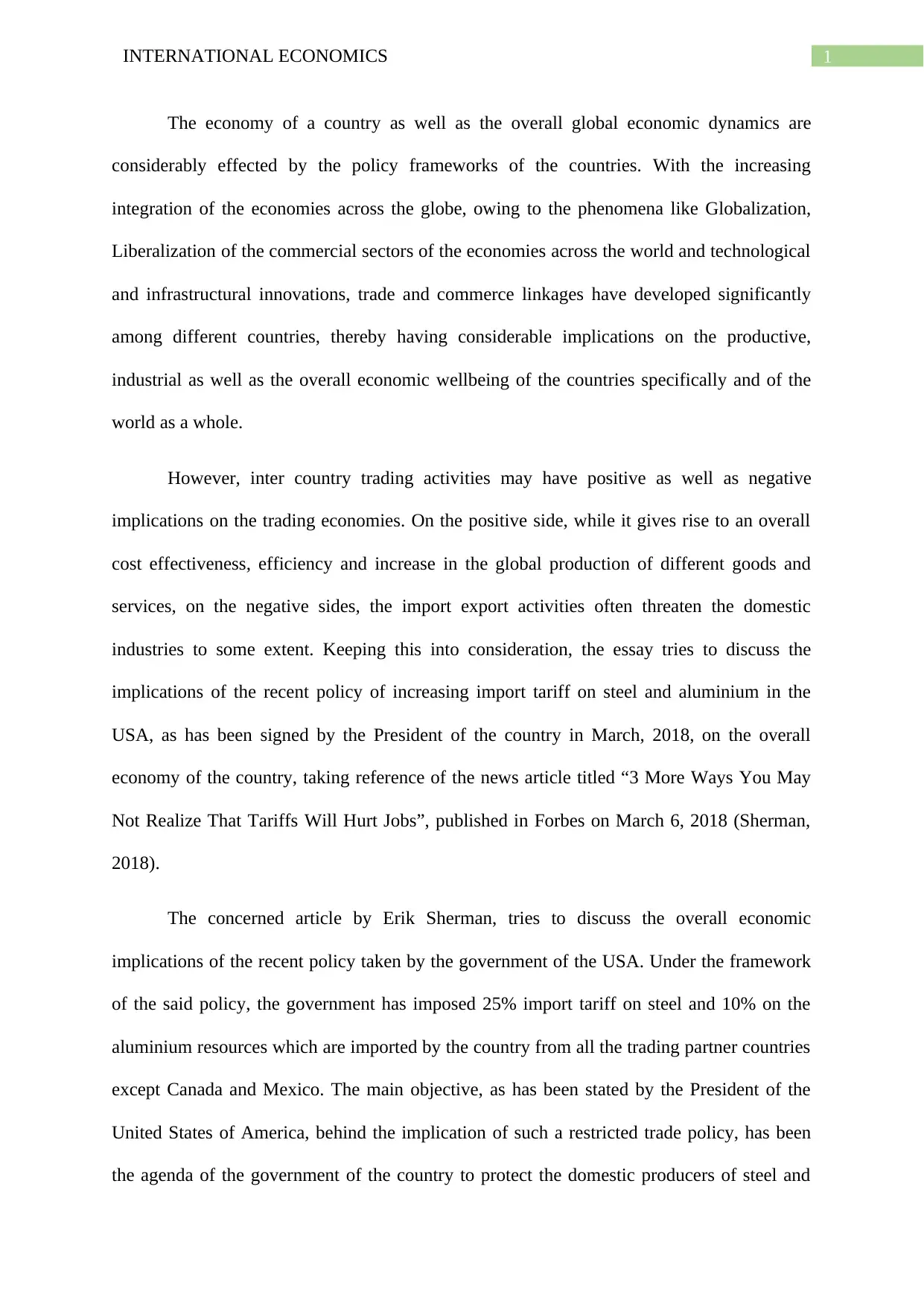
1INTERNATIONAL ECONOMICS
The economy of a country as well as the overall global economic dynamics are
considerably effected by the policy frameworks of the countries. With the increasing
integration of the economies across the globe, owing to the phenomena like Globalization,
Liberalization of the commercial sectors of the economies across the world and technological
and infrastructural innovations, trade and commerce linkages have developed significantly
among different countries, thereby having considerable implications on the productive,
industrial as well as the overall economic wellbeing of the countries specifically and of the
world as a whole.
However, inter country trading activities may have positive as well as negative
implications on the trading economies. On the positive side, while it gives rise to an overall
cost effectiveness, efficiency and increase in the global production of different goods and
services, on the negative sides, the import export activities often threaten the domestic
industries to some extent. Keeping this into consideration, the essay tries to discuss the
implications of the recent policy of increasing import tariff on steel and aluminium in the
USA, as has been signed by the President of the country in March, 2018, on the overall
economy of the country, taking reference of the news article titled “3 More Ways You May
Not Realize That Tariffs Will Hurt Jobs”, published in Forbes on March 6, 2018 (Sherman,
2018).
The concerned article by Erik Sherman, tries to discuss the overall economic
implications of the recent policy taken by the government of the USA. Under the framework
of the said policy, the government has imposed 25% import tariff on steel and 10% on the
aluminium resources which are imported by the country from all the trading partner countries
except Canada and Mexico. The main objective, as has been stated by the President of the
United States of America, behind the implication of such a restricted trade policy, has been
the agenda of the government of the country to protect the domestic producers of steel and
The economy of a country as well as the overall global economic dynamics are
considerably effected by the policy frameworks of the countries. With the increasing
integration of the economies across the globe, owing to the phenomena like Globalization,
Liberalization of the commercial sectors of the economies across the world and technological
and infrastructural innovations, trade and commerce linkages have developed significantly
among different countries, thereby having considerable implications on the productive,
industrial as well as the overall economic wellbeing of the countries specifically and of the
world as a whole.
However, inter country trading activities may have positive as well as negative
implications on the trading economies. On the positive side, while it gives rise to an overall
cost effectiveness, efficiency and increase in the global production of different goods and
services, on the negative sides, the import export activities often threaten the domestic
industries to some extent. Keeping this into consideration, the essay tries to discuss the
implications of the recent policy of increasing import tariff on steel and aluminium in the
USA, as has been signed by the President of the country in March, 2018, on the overall
economy of the country, taking reference of the news article titled “3 More Ways You May
Not Realize That Tariffs Will Hurt Jobs”, published in Forbes on March 6, 2018 (Sherman,
2018).
The concerned article by Erik Sherman, tries to discuss the overall economic
implications of the recent policy taken by the government of the USA. Under the framework
of the said policy, the government has imposed 25% import tariff on steel and 10% on the
aluminium resources which are imported by the country from all the trading partner countries
except Canada and Mexico. The main objective, as has been stated by the President of the
United States of America, behind the implication of such a restricted trade policy, has been
the agenda of the government of the country to protect the domestic producers of steel and
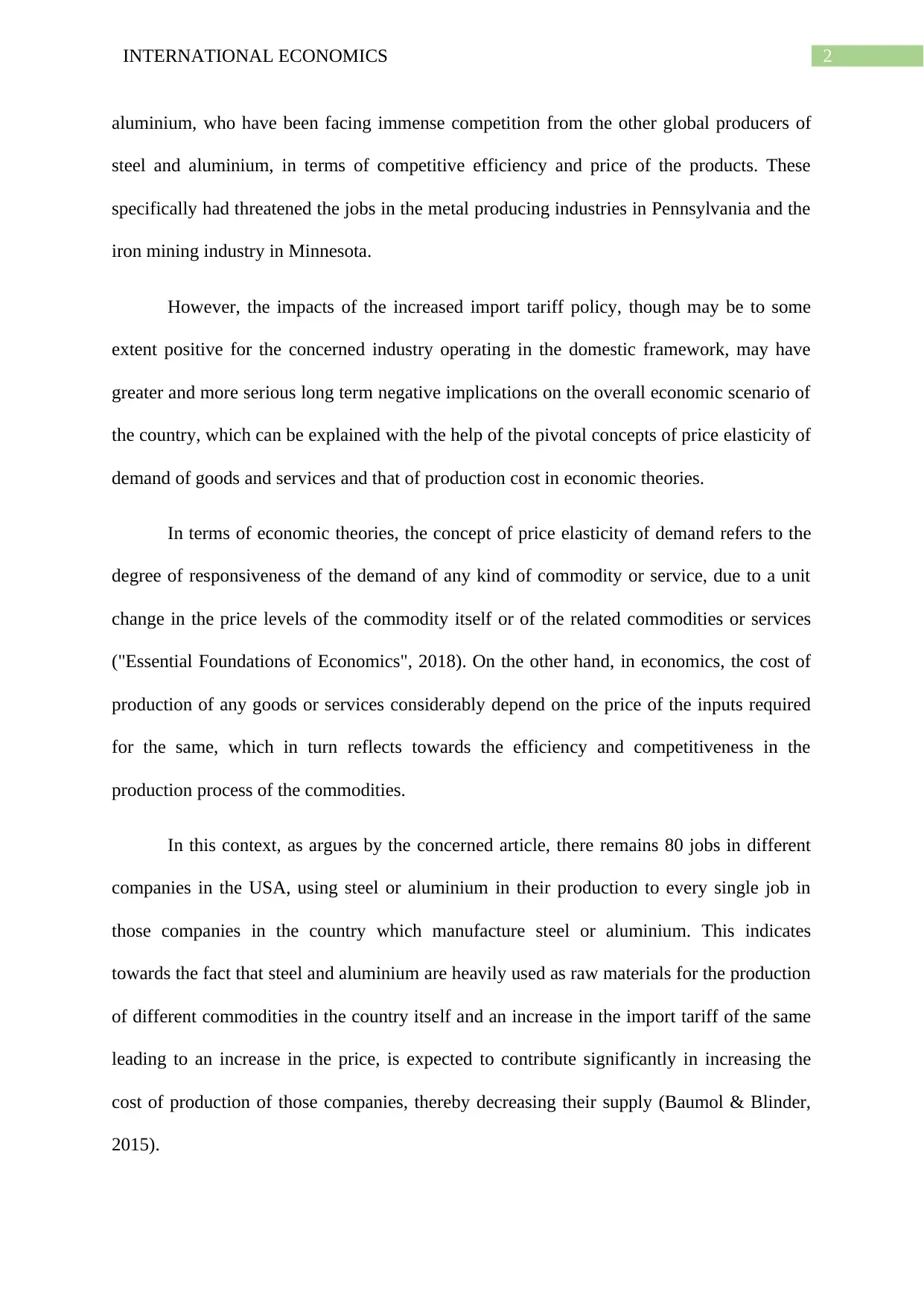
2INTERNATIONAL ECONOMICS
aluminium, who have been facing immense competition from the other global producers of
steel and aluminium, in terms of competitive efficiency and price of the products. These
specifically had threatened the jobs in the metal producing industries in Pennsylvania and the
iron mining industry in Minnesota.
However, the impacts of the increased import tariff policy, though may be to some
extent positive for the concerned industry operating in the domestic framework, may have
greater and more serious long term negative implications on the overall economic scenario of
the country, which can be explained with the help of the pivotal concepts of price elasticity of
demand of goods and services and that of production cost in economic theories.
In terms of economic theories, the concept of price elasticity of demand refers to the
degree of responsiveness of the demand of any kind of commodity or service, due to a unit
change in the price levels of the commodity itself or of the related commodities or services
("Essential Foundations of Economics", 2018). On the other hand, in economics, the cost of
production of any goods or services considerably depend on the price of the inputs required
for the same, which in turn reflects towards the efficiency and competitiveness in the
production process of the commodities.
In this context, as argues by the concerned article, there remains 80 jobs in different
companies in the USA, using steel or aluminium in their production to every single job in
those companies in the country which manufacture steel or aluminium. This indicates
towards the fact that steel and aluminium are heavily used as raw materials for the production
of different commodities in the country itself and an increase in the import tariff of the same
leading to an increase in the price, is expected to contribute significantly in increasing the
cost of production of those companies, thereby decreasing their supply (Baumol & Blinder,
2015).
aluminium, who have been facing immense competition from the other global producers of
steel and aluminium, in terms of competitive efficiency and price of the products. These
specifically had threatened the jobs in the metal producing industries in Pennsylvania and the
iron mining industry in Minnesota.
However, the impacts of the increased import tariff policy, though may be to some
extent positive for the concerned industry operating in the domestic framework, may have
greater and more serious long term negative implications on the overall economic scenario of
the country, which can be explained with the help of the pivotal concepts of price elasticity of
demand of goods and services and that of production cost in economic theories.
In terms of economic theories, the concept of price elasticity of demand refers to the
degree of responsiveness of the demand of any kind of commodity or service, due to a unit
change in the price levels of the commodity itself or of the related commodities or services
("Essential Foundations of Economics", 2018). On the other hand, in economics, the cost of
production of any goods or services considerably depend on the price of the inputs required
for the same, which in turn reflects towards the efficiency and competitiveness in the
production process of the commodities.
In this context, as argues by the concerned article, there remains 80 jobs in different
companies in the USA, using steel or aluminium in their production to every single job in
those companies in the country which manufacture steel or aluminium. This indicates
towards the fact that steel and aluminium are heavily used as raw materials for the production
of different commodities in the country itself and an increase in the import tariff of the same
leading to an increase in the price, is expected to contribute significantly in increasing the
cost of production of those companies, thereby decreasing their supply (Baumol & Blinder,
2015).
⊘ This is a preview!⊘
Do you want full access?
Subscribe today to unlock all pages.

Trusted by 1+ million students worldwide
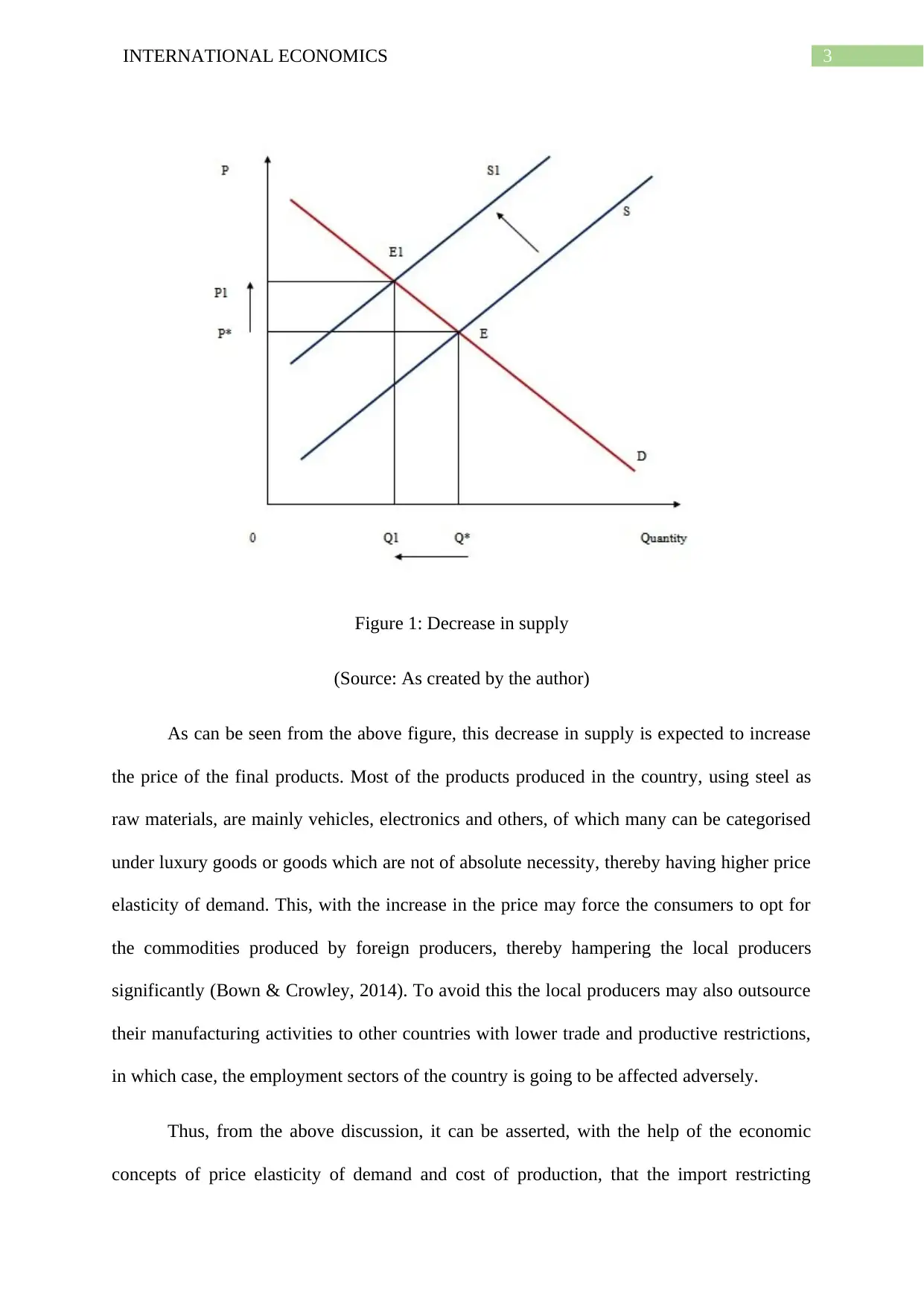
3INTERNATIONAL ECONOMICS
Figure 1: Decrease in supply
(Source: As created by the author)
As can be seen from the above figure, this decrease in supply is expected to increase
the price of the final products. Most of the products produced in the country, using steel as
raw materials, are mainly vehicles, electronics and others, of which many can be categorised
under luxury goods or goods which are not of absolute necessity, thereby having higher price
elasticity of demand. This, with the increase in the price may force the consumers to opt for
the commodities produced by foreign producers, thereby hampering the local producers
significantly (Bown & Crowley, 2014). To avoid this the local producers may also outsource
their manufacturing activities to other countries with lower trade and productive restrictions,
in which case, the employment sectors of the country is going to be affected adversely.
Thus, from the above discussion, it can be asserted, with the help of the economic
concepts of price elasticity of demand and cost of production, that the import restricting
Figure 1: Decrease in supply
(Source: As created by the author)
As can be seen from the above figure, this decrease in supply is expected to increase
the price of the final products. Most of the products produced in the country, using steel as
raw materials, are mainly vehicles, electronics and others, of which many can be categorised
under luxury goods or goods which are not of absolute necessity, thereby having higher price
elasticity of demand. This, with the increase in the price may force the consumers to opt for
the commodities produced by foreign producers, thereby hampering the local producers
significantly (Bown & Crowley, 2014). To avoid this the local producers may also outsource
their manufacturing activities to other countries with lower trade and productive restrictions,
in which case, the employment sectors of the country is going to be affected adversely.
Thus, from the above discussion, it can be asserted, with the help of the economic
concepts of price elasticity of demand and cost of production, that the import restricting
Paraphrase This Document
Need a fresh take? Get an instant paraphrase of this document with our AI Paraphraser
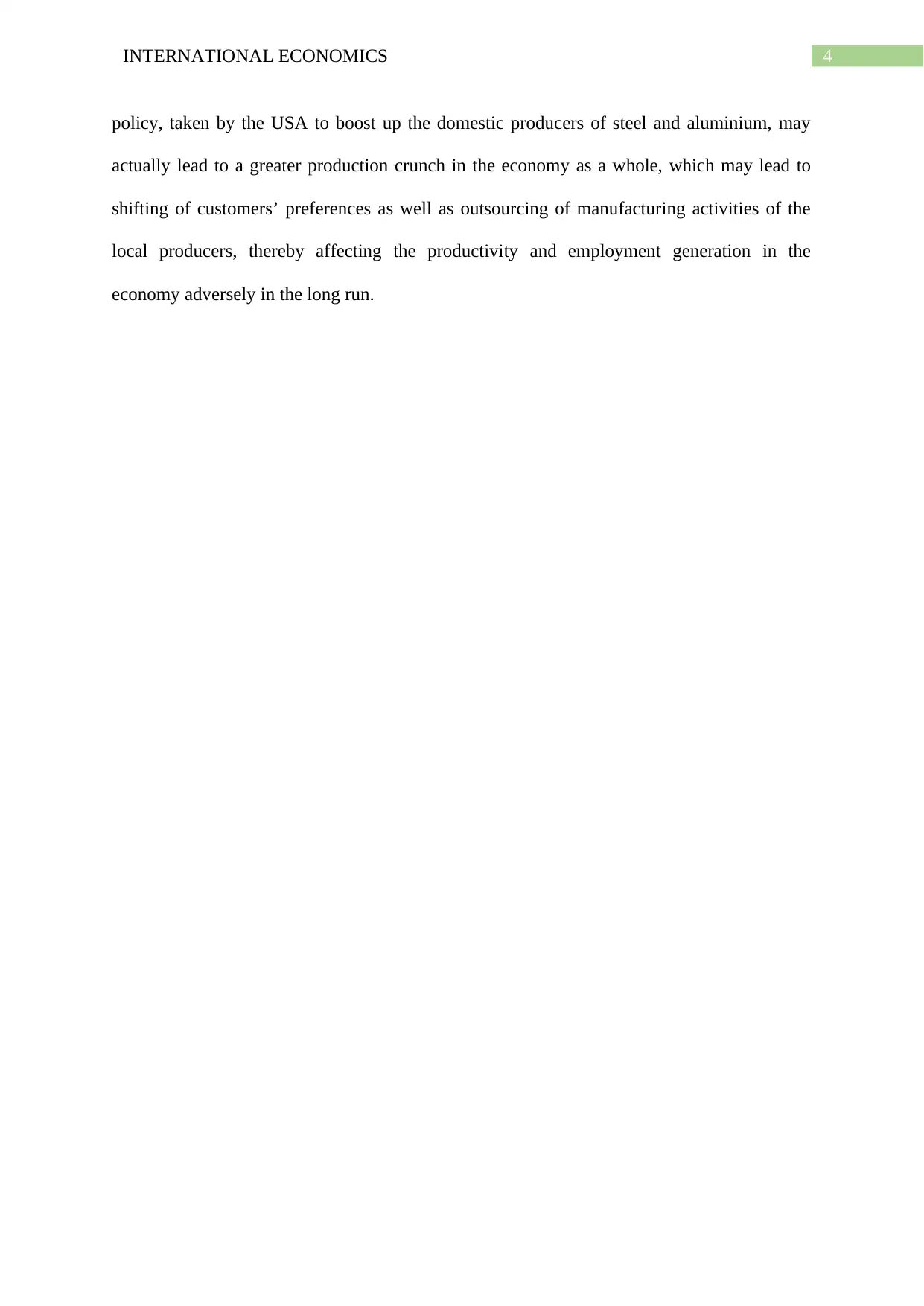
4INTERNATIONAL ECONOMICS
policy, taken by the USA to boost up the domestic producers of steel and aluminium, may
actually lead to a greater production crunch in the economy as a whole, which may lead to
shifting of customers’ preferences as well as outsourcing of manufacturing activities of the
local producers, thereby affecting the productivity and employment generation in the
economy adversely in the long run.
policy, taken by the USA to boost up the domestic producers of steel and aluminium, may
actually lead to a greater production crunch in the economy as a whole, which may lead to
shifting of customers’ preferences as well as outsourcing of manufacturing activities of the
local producers, thereby affecting the productivity and employment generation in the
economy adversely in the long run.
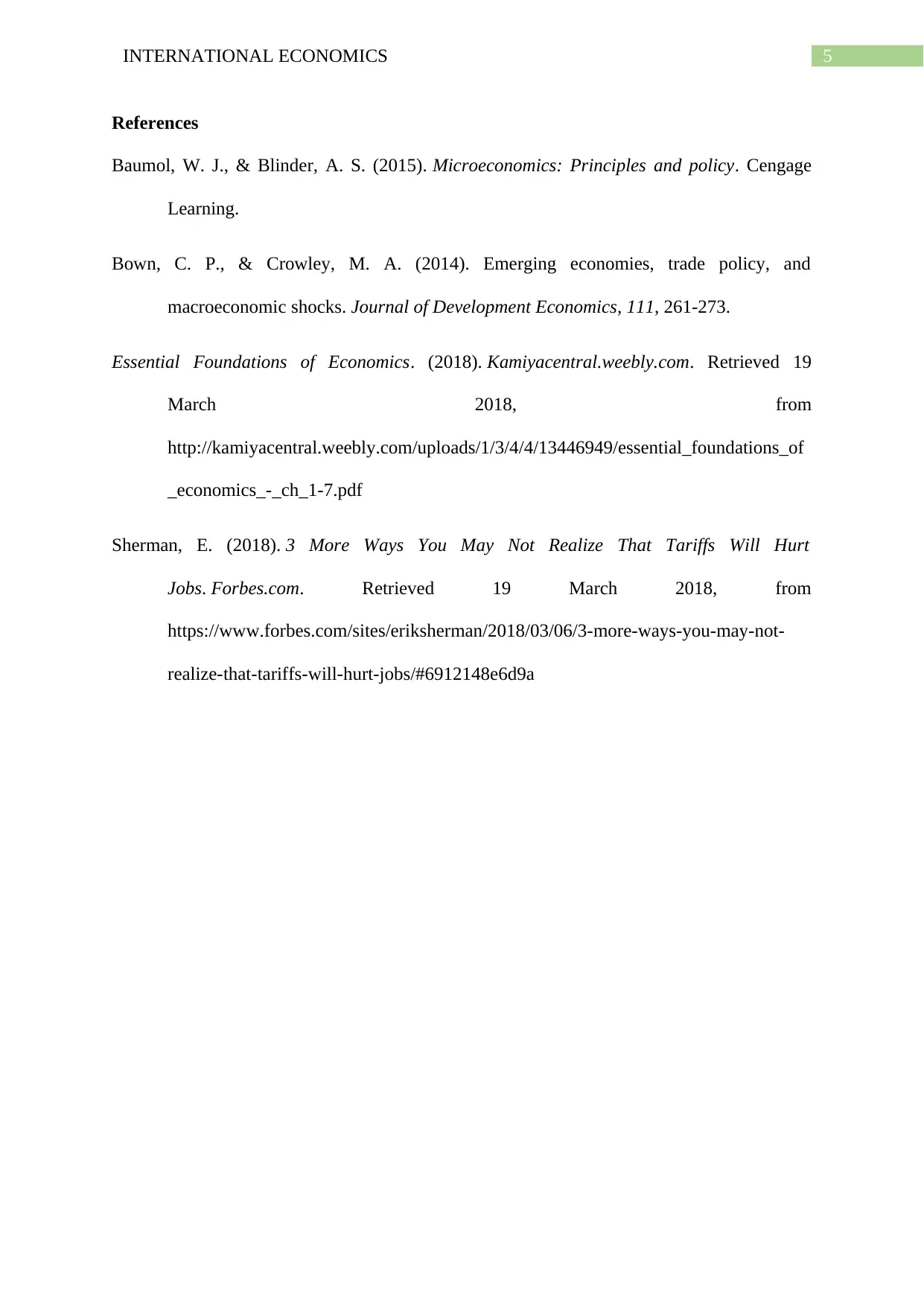
5INTERNATIONAL ECONOMICS
References
Baumol, W. J., & Blinder, A. S. (2015). Microeconomics: Principles and policy. Cengage
Learning.
Bown, C. P., & Crowley, M. A. (2014). Emerging economies, trade policy, and
macroeconomic shocks. Journal of Development Economics, 111, 261-273.
Essential Foundations of Economics. (2018). Kamiyacentral.weebly.com. Retrieved 19
March 2018, from
http://kamiyacentral.weebly.com/uploads/1/3/4/4/13446949/essential_foundations_of
_economics_-_ch_1-7.pdf
Sherman, E. (2018). 3 More Ways You May Not Realize That Tariffs Will Hurt
Jobs. Forbes.com. Retrieved 19 March 2018, from
https://www.forbes.com/sites/eriksherman/2018/03/06/3-more-ways-you-may-not-
realize-that-tariffs-will-hurt-jobs/#6912148e6d9a
References
Baumol, W. J., & Blinder, A. S. (2015). Microeconomics: Principles and policy. Cengage
Learning.
Bown, C. P., & Crowley, M. A. (2014). Emerging economies, trade policy, and
macroeconomic shocks. Journal of Development Economics, 111, 261-273.
Essential Foundations of Economics. (2018). Kamiyacentral.weebly.com. Retrieved 19
March 2018, from
http://kamiyacentral.weebly.com/uploads/1/3/4/4/13446949/essential_foundations_of
_economics_-_ch_1-7.pdf
Sherman, E. (2018). 3 More Ways You May Not Realize That Tariffs Will Hurt
Jobs. Forbes.com. Retrieved 19 March 2018, from
https://www.forbes.com/sites/eriksherman/2018/03/06/3-more-ways-you-may-not-
realize-that-tariffs-will-hurt-jobs/#6912148e6d9a
⊘ This is a preview!⊘
Do you want full access?
Subscribe today to unlock all pages.

Trusted by 1+ million students worldwide
1 out of 6
Related Documents
Your All-in-One AI-Powered Toolkit for Academic Success.
+13062052269
info@desklib.com
Available 24*7 on WhatsApp / Email
![[object Object]](/_next/static/media/star-bottom.7253800d.svg)
Unlock your academic potential
Copyright © 2020–2026 A2Z Services. All Rights Reserved. Developed and managed by ZUCOL.





